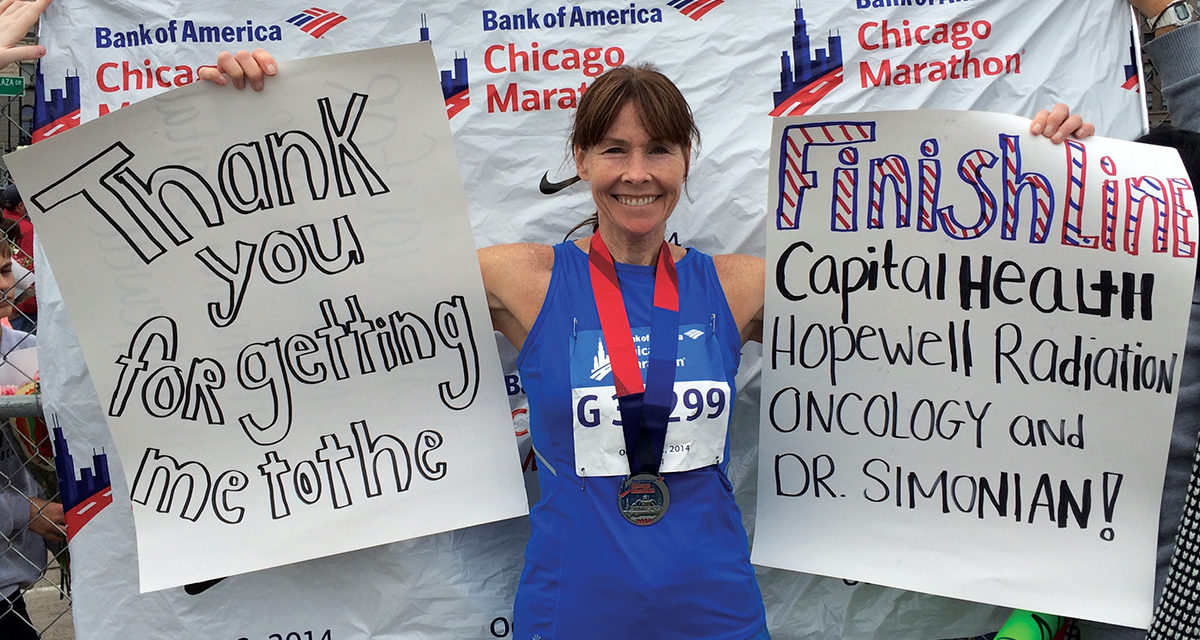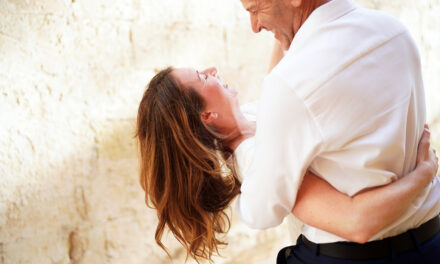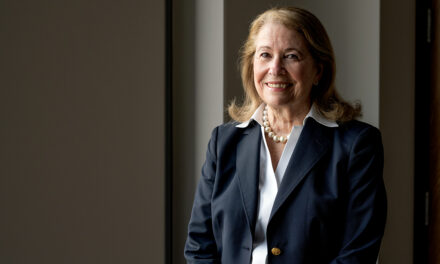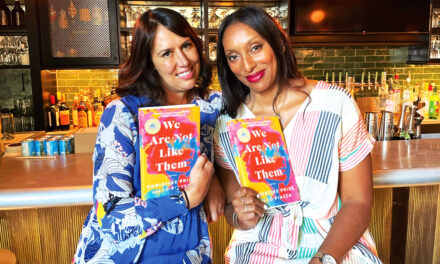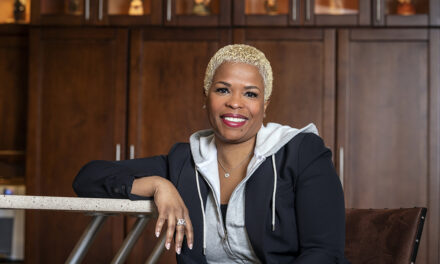I didn’t have a single symptom when I was diagnosed with life-threatening rectal cancer. In fact, I was a marathon runner at the time. I’ve been cancer-free for 6 years now, and I’m making the most of my second chance at life and helping others make the most of theirs.
There was just something about the way my doctor looked at me as he nudged me to get a colonoscopy that inspired me to actually make the appointment.
It was 2013, and I was 53 years old and totally healthy. All of my friends had said the same thing after they’d had their colonoscopies, which went something like, “The prep is so much worse than the actual procedure.” I figured I had a couple more years of procrastination. But after that physical where my general practitioner nudged me to get a baseline test, something inside me told me to listen.
At my initial appointment with Dr. Armen Simonian, the Capital Health gastroenterologist who would do my colonoscopy, I had a digital rectal exam. And after finding a spot that looked suspicious, the doctor looked at me and said, “I’m concerned.”
Concerned? I scoffed. I had no symptoms. What could possibly be wrong?
Two days later, I was downing the gross-tasting magnesium citrate to clear my bowels and a tiny scope was surveying my colon. A week after that, I sat in that specialist’s office again and listened incredulously as he said, “I’m sorry to say, but you’ve got cancer.”
I didn’t believe him. When he showed me a picture of my tumor, I actually thought my test results had gotten mixed up with someone else’s. I just kept repeating, “Are you sure?” I’ll always remember how calm he remained until I finally surrendered and stopped hoping that it wasn’t happening to me.
Diagnosis and Disbelief
It turned out that it’s entirely normal for rectal cancer patients to be symptom-free until the later stages of the disease. That’s why it’s called the “Silent Killer.” In the days after learning I had Stage 2 rectal cancer, I felt like I was on an episode of House. A team of doctors—the best of the best—descended on me to help guide me through how I was going to fight this disease and beat it. I started chemo and radiation within a month. If that didn’t work, I’d need surgery.
When I started my treatment in 2013, I made a decision that I regret: I kept the news about my diagnosis from my daughter. Gianna was a senior in high school at the time, and it was just after the holidays—life was so good. She was getting ready for a big dance show, deciding where she was going to go to college, and she couldn’t wait for her senior prom. I didn’t want to share the heaviness of what I was going through onto her shoulders. After all, it’s just me and her—I’ve been a single mom since she was 2 years old. My life has centered around my daughter, making sure she got the best education and was given every opportunity imaginable to be happy and thrive.
I mean, life for a single mom is tough, no matter which way you look at it. Even in the best of times, it still is tough. Motherhood is the best thing that’s ever happened to me, but nothing could have prepared me for this extreme situation. I could not bear to inflict the pain and worry that I knew would come with the news of my stage 2 rectal cancer diagnosis.
So, I hid my new truth from her. The IV chemo bag connected through the PICC line to my shoulder couldn’t be spotted if my shirts were baggy enough, and I chalked up my fatigue to the winter blahs.
In fact, I didn’t tell any of my family or friends about my diagnosis. I just wanted to be able to get through this ordeal and look back on it as if it were a little blip on the proverbial screen. I had no idea what lay ahead of me, as far as what the treatment would really be like—no idea I wouldn’t have the energy to drive myself to the infusion center, no idea of the amount of physical pain I would experience from the radiation burns, and no idea of the amount of support that I would need. Sure, I knew what I was facing was serious. But I honestly thought, I can do this. I don’t have to inconvenience anybody.
Then, about a month into my treatment, I was too exhausted to drive Gianna to school. I could tell there was already a lot on her mind—she was really stressing about college—but I knew it was time, and I said, “Look, I hate to do this to you, but I’ve got to tell you something.”
Gianna was upset on two levels: one, that it was happening to me, and two, that I didn’t tell her sooner. Of course, she stepped up. She was with me during hospital stays, and she even had to call an ambulance one night when the radiation and chemo had made me so sick and weak that I was on the verge of passing out. The treatment is like that sometimes. It can take you to a point where you don’t even feel in control of your body anymore.
But I made it—we made it—and just about a year after I started treatment, I was feeling like my old self again.
I don’t know how much longer I have to live—nobody does. I don’t know what the future holds, but I do know that I want to surround myself with people who add value to my life, who are going to support me.

Philly Achilles
More than 60 volunteers come from all over the Delaware Valley to train with visually impaired athletes and those with a variety of other disabilities and guide them through marathons, half marathons, and other races. One of those people is Eileen Mannix. “It was the Philadelphia Marathon, and I was running as a participant. And, passing me in the last mile were two people who were connected by a tether. They both had these bright yellow shirts that said, ‘Achilles.’ And I could see that one of the runners was blind and the other runner was a guide. In that moment, I was like, That’s what I want to do. I want to help people.”
Whether you or someone you know has a disability, or you would like to volunteer your time while getting fit, Achilles is the perfect opportunity to connect with like-minded individuals in the community. Volunteers can join Philly Achilles at Two Liberty Place in Philadelphia at 9 a.m. on Saturday mornings.


Running On, Cancer Free
When I look back at that year of cancer treatment, what I remember most is the support I received from Gianna and the Capital Health doctors and nurses taking care of me. It was a difficult—sometimes brutal—journey. I remember weeks where I could barely will myself to have a few sips of Gatorade and eat crackers and mini bagels. And that chemo brain is real. There were times when I would just kind of forget who I was, where I was, and what I was supposed to be doing.
Dr. Simonian and my radiation oncologist Dr. Shirnett Williamson never let me lose hope. The medical staff gave me so much strength and filled me with positivity, encouraging me with a collective, “You’ve got this. You can do this. It’s going to be over so soon.”
I started running again about a year after my diagnosis, and my first race back was the Chicago Marathon in October 2014. To this day, whether I’m running a 5K, a 5-miler, a marathon, or an ultramarathon, I can still hear my daughter and those doctors’ and nurses’ voices encouraging me.
These days, I try to pay that support forward by volunteering with an amazing organization called Achilles. I first learned about them when I ran the Philadelphia Marathon. Two runners passed me in the last mile—they were tethered to each other by a small rope—and wore bright yellow shirts that said, “Achilles.” It was clear that one of the runners was blind. In that moment, I realized I wanted to be that runner helping another.
I’ve been a guide for a few years, and most of the athletes I run with are blind or visually impaired. I’m currently training for a Spartan Race with a superfast, superstrong Achilles athlete, Matt McAvoy. We go to the Comcast Center in Philadelphia and run the steps and work out at my gym, Metabolic Functional Fitness in Hamilton, NJ with owner and coach John Wojciechowski. We’re also improving our communication with each other so that we both make it through the intense obstacle course. I’m learning what I’ll need to say to him to help us stick together as we crawl under wire, climb ropes, carry sandbags, and more. Training myself to be that precise with my language is as difficult as getting physically ready for the race. But I’m sure the feeling we’ll both have when we cross the finish line together will be indescribably sweet.
I have enough distance now, 6 years after that fateful colonoscopy, to look at my experience from a bird’s-eye view. There’s the mistake I made, not being transparent about my cancer with my daughter. I got that wrong; I should’ve told her right away. If the cancer had killed me, she might’ve always wondered why I didn’t tell her. Maybe she would’ve even thought that there was something she could’ve done, and can you imagine leaving your child thinking that she could have done something?
But there are other things I got right. I learned from this experience. It made me stronger. It opened my eyes to people in the world suffering from unfortunate things. And it made me want to be that person saying “You’ve got this!” to someone else who needs to hear it most.

